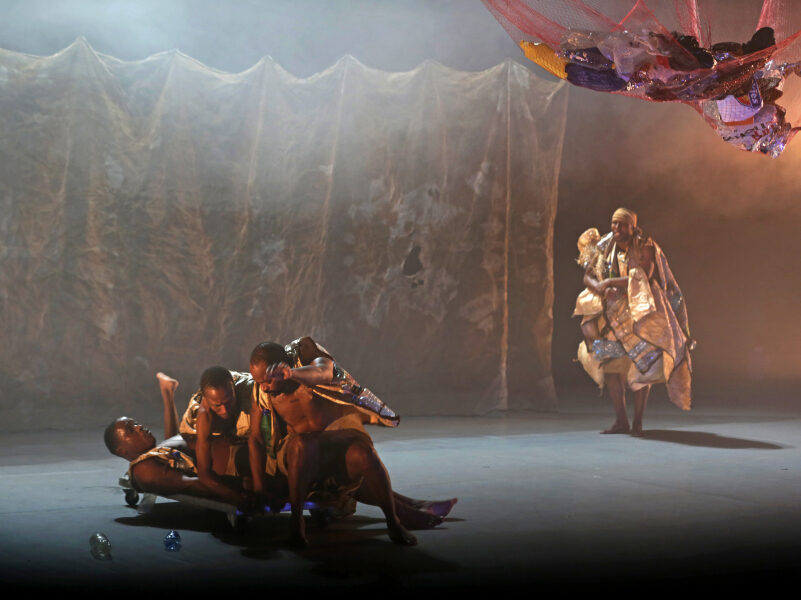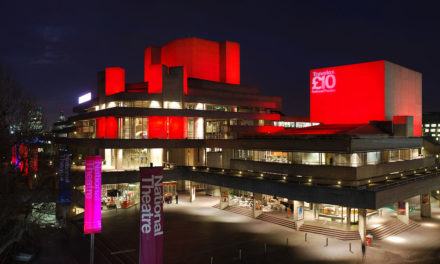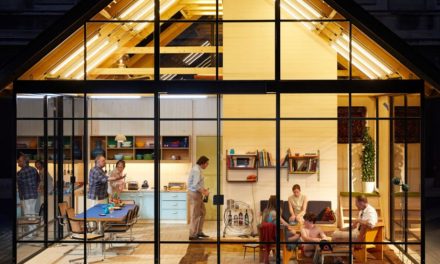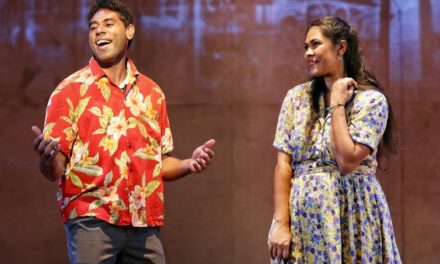Ismail Mahomed, CEO of the Market Theatre Foundation, visited the National Arts Festival in Makhanda (formerly Grahamstown) recently. He shares his reflections on the Fringe programme with The Theatre Times:
Arts festivals are more than showcases of creativity. Festivals are a reflection of the political mood of a nation. At the National Arts Festival in Makhanda, the frenetic mood of South African politics has always been expressed through a myriad of creativity by the artists on the Fringe. These are artists who often unsubsidized pour in their own personal resources into making work that echoes the frustrations, hopes, fears, joy, pains, trauma and healing that is at the core of South Africa’s experiment with transformation. This year’s Fringe festival programme is abundantly evident that we are a nation with many unresolved issues; and that our artists have not yet lost their passion to be the catalysts who want to drive us into a dialogue with ourselves and with each other.
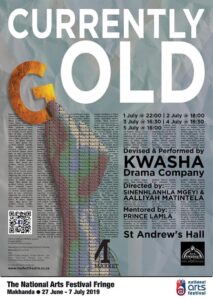
Their voices on the stages of the Fringe venues are shouting, protesting, raising disturbing questions, asking rhetorical questions and sometimes even providing didactic answers. They’re also there celebrating, recalling memory, re-envisioning new possibilities and often times reminding us that our greatest resource for survival is hope.
They make us cling on to hope and make us believe that there still will be a new dawn. They fuel our resolve to adapt and never to just give up and die! Since the 1980s when the Fringe festival found its roots it has echoed our national consciousness. In the brutal years of the State of Emergency of the eighties when the SADF’s tanks took position at the Monument on Settler’s Hill to show the Nationalist government’s political force, it was down below in the city’s fringe venues where the people’s power was resonating in song, dance, music and theatre. In Madiba’s era of redemption, forgiveness and “rainbow nationism” that paralyzed our political fury in the nineties the refrain on the Fringe stages was “reach out and touch somebody’s hand”.
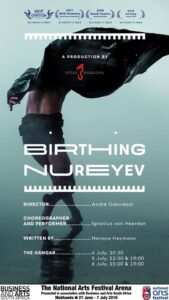 While it was a feel-good moment, the reach-out eventually became very much a handshake, a cuddle, a hug and an incestuous relationship. It became a period when the Fringe lost some of its political edge because that one single ingredient which makes for good theatre —- conflict —- which gives us the experience of walking out of a theatre challenged was replaced with that boring sentiment of it all “ended happily ever after”. That mood reflected the mood of a nation that trusted its politicians who would also give us a happy ever after ending. The apathy wasn’t made any easier by a newly introduced public arts funding mechanism that was as clueless then as it is now about how to fund the arts for social and economic growth. It was easy to get funding then because funding proposals didn’t have to articulate any artistic vision.
While it was a feel-good moment, the reach-out eventually became very much a handshake, a cuddle, a hug and an incestuous relationship. It became a period when the Fringe lost some of its political edge because that one single ingredient which makes for good theatre —- conflict —- which gives us the experience of walking out of a theatre challenged was replaced with that boring sentiment of it all “ended happily ever after”. That mood reflected the mood of a nation that trusted its politicians who would also give us a happy ever after ending. The apathy wasn’t made any easier by a newly introduced public arts funding mechanism that was as clueless then as it is now about how to fund the arts for social and economic growth. It was easy to get funding then because funding proposals didn’t have to articulate any artistic vision.
It just needed to trade on politically correct concepts; and whilst funding became abundant, creativity became mediocre and bums on seats became more bored of actors singing, “The young ones, Darling we’re the young ones And young ones shouldn’t be afraid To live, love While the flame is strong”.
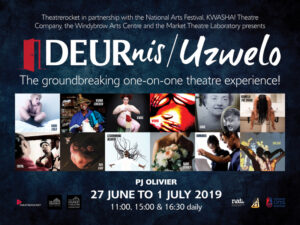
And of course, through that era of living while the flame was strong artists were flashing mass produced government-issued condoms because funding for the arts became so much easier if every play was going to be about AIDS; and if artists who scripted pathetic and poorly researched plays about AIDS would agree that they would distribute condoms at their venues. It was a time when it was so easy for arts funding to screw the artists (no condom required) and for artists to shoot themselves in the foot.
Then, in the post-nineties era, Thabo Mbeki came along like an apparition on the hill walking with Manto Tshabalala at his side. In this moment, artists threw aside their government-issued condoms. They picked up the garlic, beetroots and African 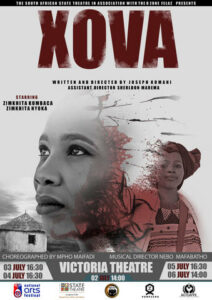 potatoes that Manto Tshabalala wanted to force-feed them and they walked on to the stages and used it to pelter both Tshabalala and Mbeki who were flustered that the artists were throwing vegetables at them and that the artists wanted to talk about antiretrovirals. It was also a time when artists wanted to talk about the inclusivity that was painted in Madiba’s rainbow but which was not getting a share in the pot of gold that was at the end of the rainbow. Gender, sexuality and all other marginalized identities took over the stages. It was clear that this was the era that catalogued productions by LGBT but with leaving enough space for more alphabets to be added on as it became unravelled. It was a time when the Fringe was once again waking up from its political slumber and was discovering that it had a heartbeat that was loud and pulsating but the one thing it hadn’t yet discovered was that the heartbeat was African!
potatoes that Manto Tshabalala wanted to force-feed them and they walked on to the stages and used it to pelter both Tshabalala and Mbeki who were flustered that the artists were throwing vegetables at them and that the artists wanted to talk about antiretrovirals. It was also a time when artists wanted to talk about the inclusivity that was painted in Madiba’s rainbow but which was not getting a share in the pot of gold that was at the end of the rainbow. Gender, sexuality and all other marginalized identities took over the stages. It was clear that this was the era that catalogued productions by LGBT but with leaving enough space for more alphabets to be added on as it became unravelled. It was a time when the Fringe was once again waking up from its political slumber and was discovering that it had a heartbeat that was loud and pulsating but the one thing it hadn’t yet discovered was that the heartbeat was African!
While artists sang, danced and played on the Fringe’s stages Mbeki stood on a hill aloof from the people and proclaimed:
“I owe my being to the hills and the valleys, the mountains and the glades, the rivers, the deserts, the flowers, the trees, the seas and the ever-changing seasons that define the face of our native land.”
Perhaps it was because of Mbeki’s deep intellectualism and great aloofness that artists 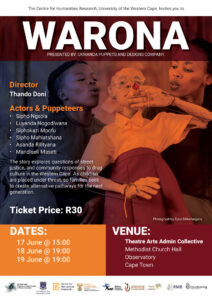 didn’t hear that in the subtext of his speech they could have been inspired to ask the questions about colonialism. They woke up almost ten years too late to talk about colonialism and to echo give back the land, hills and the valleys, the mountains and the glades, the rivers, the deserts, the trees, the flowers and the seas. It took almost the past decade for Zuma to wake up the artists and to get them to look at the lay of the land. Initially, the artists focused mainly on the comedy that was playing out in the fire pool at Nkandla and the tragedy of how the people’s purse was being raped at the Saxonwold Shebeen and how people were being shot off the land at Marikana. It took the latter part of Zuma’s tenure before Fringe artists could really join in the chorus and sing, “Give back the land, the whole land and nothing but the land”.
didn’t hear that in the subtext of his speech they could have been inspired to ask the questions about colonialism. They woke up almost ten years too late to talk about colonialism and to echo give back the land, hills and the valleys, the mountains and the glades, the rivers, the deserts, the trees, the flowers and the seas. It took almost the past decade for Zuma to wake up the artists and to get them to look at the lay of the land. Initially, the artists focused mainly on the comedy that was playing out in the fire pool at Nkandla and the tragedy of how the people’s purse was being raped at the Saxonwold Shebeen and how people were being shot off the land at Marikana. It took the latter part of Zuma’s tenure before Fringe artists could really join in the chorus and sing, “Give back the land, the whole land and nothing but the land”.
Upon arriving in Makhanda yesterday I sat in one of my old favourite coffee haunts and browsed through the Fringe programme.I was expecting it to be filled with Ramaphosa’s sentiment of “Thuma Mina”. It wasn’t!
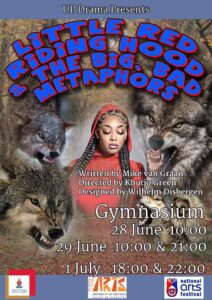 Instead, the Fringe is reclaiming its own powerful political voice. Madiba’s rainbow is being deconstructed. It is turning Mbeki’s aloofness into vigilance. It is fighting for the gold that was stolen from the pot at the end of the rainbow by Zuma. It is looking straight-faced at Ramaphosa and saying they won’t dance to his “Thuma Mina”. Twenty-five years later artists at the Fringe festival are wisening up. They’re once again shouting out that they won’t get sent anywhere. They are nobody’s emissaries and messengers. They have their own voices to stir our souls and to awaken our consciousness.
Instead, the Fringe is reclaiming its own powerful political voice. Madiba’s rainbow is being deconstructed. It is turning Mbeki’s aloofness into vigilance. It is fighting for the gold that was stolen from the pot at the end of the rainbow by Zuma. It is looking straight-faced at Ramaphosa and saying they won’t dance to his “Thuma Mina”. Twenty-five years later artists at the Fringe festival are wisening up. They’re once again shouting out that they won’t get sent anywhere. They are nobody’s emissaries and messengers. They have their own voices to stir our souls and to awaken our consciousness.
They are the thinkers, the shapers and the leaders. They’re taking back their political voices that were numbed by political incompetence and political manipulation of arts funding.
This time around, they’re making their political voices heard with or without arts
funding. They are loud. They are clear and they are bold. Their talent is sometimes raw. Sometimes the productions may be a little rough on the edges. The one certainty though is that the Fringe is a free-for-all curation of the nation’s frustrations and its determination to heal itself. And the artists are determined to bring about the healing through their fiery poetry, music, dance and storytelling. It resonates now sometimes as loudly as it did during the 1980s State of Emergency years. Only this time there isn’t the SANDF trucks circling the town. The ink from Section 16 of the South African Constitution which guarantees freedom of expression and freedom of creativity is keeping away the army trucks and soldiers.
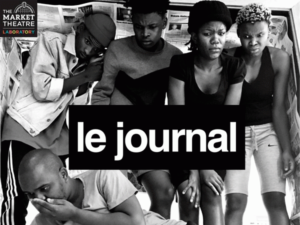
This post was written by the author in their personal capacity.The opinions expressed in this article are the author’s own and do not reflect the view of The Theatre Times, their staff or collaborators.
This post was written by Ismail Mahomed.
The views expressed here belong to the author and do not necessarily reflect our views and opinions.

